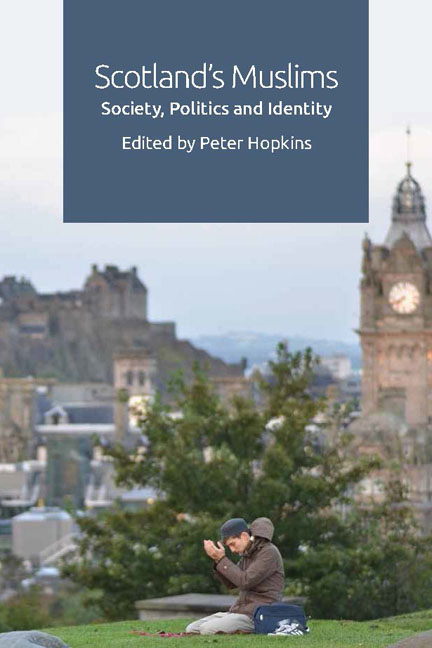Book contents
- Frontmatter
- Contents
- List of Figures and Tables
- Acknowledgements
- Notes on the Contributors
- 1 Introduction Scotland's Muslims: Early Settlement, Current Context and Research Themes
- 2 Health The Health Profile of Muslims in Scotland
- 3 Education Educational Outcomes of Muslim Pupils in Scotland and Parents' Mobilisation of Different Forms of Capital
- 4 Political Participation Young Muslims' Political Interests and Political Participation in Scotland
- 5 Gender and Migration The Role of the ‘Other’ Woman in Shaping the Subjectivities of Recent Muslim Migrant Women to Scotland
- 6 Sexuality Scottish Muslim Gay Men and the Troubling Intersection of Sexuality and Religion
- 7 Young People Muslim Youth in Scotland: Politics, Identity and Multicultural Citizenship
- 8 Generational Relations Gender and Generational Relations for Muslim Women in Scotland
- 9 Heritage Feeling Scottish and Being Muslim: Findings from the Colourful Heritage Project
- 10 Multiculturalism Multiculturalism and Scotland: ‘Bringing the Outside into the Middle’
- 11 Media Muslim Engagement with the Mainstream Media in a Scottish Context
- 12 Representation Representing Islam at the Edinburgh International Book Festival
- 13 Integration Halal Scots: Muslims' Social Integration in Scotland
- Index
8 - Generational Relations Gender and Generational Relations for Muslim Women in Scotland
Published online by Cambridge University Press: 23 June 2018
- Frontmatter
- Contents
- List of Figures and Tables
- Acknowledgements
- Notes on the Contributors
- 1 Introduction Scotland's Muslims: Early Settlement, Current Context and Research Themes
- 2 Health The Health Profile of Muslims in Scotland
- 3 Education Educational Outcomes of Muslim Pupils in Scotland and Parents' Mobilisation of Different Forms of Capital
- 4 Political Participation Young Muslims' Political Interests and Political Participation in Scotland
- 5 Gender and Migration The Role of the ‘Other’ Woman in Shaping the Subjectivities of Recent Muslim Migrant Women to Scotland
- 6 Sexuality Scottish Muslim Gay Men and the Troubling Intersection of Sexuality and Religion
- 7 Young People Muslim Youth in Scotland: Politics, Identity and Multicultural Citizenship
- 8 Generational Relations Gender and Generational Relations for Muslim Women in Scotland
- 9 Heritage Feeling Scottish and Being Muslim: Findings from the Colourful Heritage Project
- 10 Multiculturalism Multiculturalism and Scotland: ‘Bringing the Outside into the Middle’
- 11 Media Muslim Engagement with the Mainstream Media in a Scottish Context
- 12 Representation Representing Islam at the Edinburgh International Book Festival
- 13 Integration Halal Scots: Muslims' Social Integration in Scotland
- Index
Summary
INTRODUCTION
Researchers have paid attention to the significance of intergenerational research for several years (see Maxey, 2006; Punch, 2002; Skelton, 2000; Tucker, 2003; Valentine, 2003). Some important scholarly works have focused on intergenerationality and identities, particularly using intersectionality to understand people's multiple identities (Crenshaw, 1993; Brah and Phoenix, 2004; Dwyer, 1999; Nayak, 2003; McDowell, 2003; Hopkins, 2006). Pain et al. (2001: 141) argue that ‘age is a social construction’ and Hopkins et al. (2011) draw attention to the complexity of intergenerationality and its functions in the everyday lives of younger and older generations by examining the experiences of Christian families in Scotland. There are some influential scholarly works on the intergenerational identity of Scottish Muslim men (e.g. Hopkins, 2006), but there is still a dearth of intergenerational research on Scottish Muslim women's identities. By intergenerational research, I mean the study of the differences and similarities – and the transformation between generations – in the Muslim community. This phenomenon is most evident in the dynamic relationship between mothers and daughters, but the interactions between other family members are also important.
Indeed, generational characteristics are not a static phenomenon, but dynamic (see Hopkins and Pain, 2007). The multidimensional benefits of intergenerational research lie in the importance of building a positive connected society. Intergenerational knowledge may possibly help society to build bridges between generations. As a result, it allows us to anticipate changes that may occur in society, and the best ways to deal with these in the future. I believe it is crucial to expand the academic knowledge of intergenerational experiences, as this could lead to a future society more attuned to its diverse communities and could possibly address potential tensions and conflict in order to develop solutions.
My research focuses on Muslim women in order to shed light on the changes and transformations that occur between generations. Intergenerational research of this kind may provide a platform to discuss social integration and equality issues.
Understanding intergenerational relations for Muslim women in Scotland is important, as it allows us to explore the complexity of identities and how these change or not over time. It is also important because demographic changes in Muslim communities – particularly given the more recent arrival of diverse Muslim communities to Scotland – may alter intergenerational relationships. Also, the transformations of the family through gender and generational dynamics (including possible tensions, conflicts, strengths and women's agency) are important considerations.
- Type
- Chapter
- Information
- Scotland's MuslimsSociety, Politics and Identity, pp. 155 - 170Publisher: Edinburgh University PressPrint publication year: 2017

